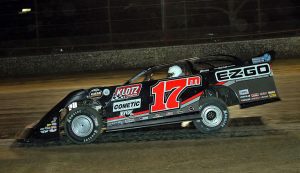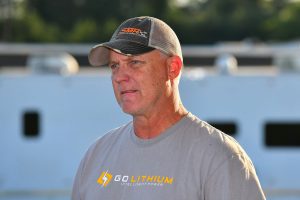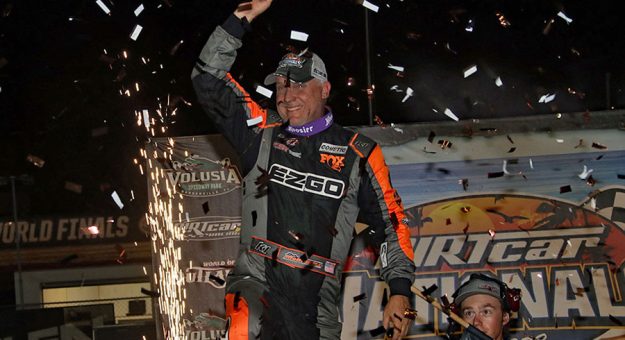When Dale McDowell entered the Sunshine Nationals at Florida’s Volusia Speedway Park in January, his goal was simply to get some laps under his belt after having been out of the seat for several months.
But like the dirt late model ace has done hundreds of times in his career, he won in his familiar No. 17m car.
And while every win is special, this one in the season opener for the World of Outlaws CASE Construction Late Models was particularly emotional for McDowell, coming on the heels of his battle with prostate cancer.
Then, the driver known as “Mac Daddy” won again during Speedweeks the next month at Volusia and had one of the most consistent Florida stretches of his career.
“I guess the good Lord thought I needed a boost,” McDowell told SPEED SPORT. “I felt really blessed to be able to go down there and do that, and it humbles you.”
McDowell, 56, has had a divine career in the dirt world.
He is a native of Rossville, Ga., a town near the Tennessee border, and began racing in the Volunteer State at Cleveland Speedway in 1981 when he was 14 years old. His father was also a racer, and McDowell soon followed in his footsteps.
McDowell has driven for some of the biggest names in dirt racing during his career, including O.J. Monday, Larry Shaw and Clint Bowyer, along with multiple stints with his family’s teams. Highlights of his extensive résumé include wins at Bristol in 2000, the World 100 at Eldora Speedway in 2005 and Eldora’s Dirt Late Model Dream in 2014, several championships and induction into the National Dirt Late Model Hall of Fame.
He also competed on occasion in the ARCA Menards Series during the late 1980s and early 1990s, turning in multiple top-five finishes.
However, budget restraints and the convenience of racing on dirt tracks in the Southeast led to McDowell making his career on dirt, which was always his first passion.

“I grew up dirt racing and man I love it,” he said. “It’s the best.”
McDowell makes his home in in the Chattanooga area, after having lived in Chickamauga, Ga., for nearly 30 years. He spent many seasons as part of grueling dirt late model tours, but now hand picks his races with his brother under the Shane McDowell Racing banner.
“I’m definitely an advocate of a young racer getting out and doing (the national tours),” McDowell said. “It made me a better racer. It made us a better team. It probably just helped us all the way around. But once you get a little older, we just kind of set our goals on being able to race an outlaw schedule. We’ll go run Lucas (Oil Late Model Dirt Series) races or World of Outlaws races or non-sanctioned races, independent races. Just whatever looks feasible.
“We try to go run all the marquee events as well, the World and the Dream and all that stuff, so it’s fun. It’s fun that way, it’s just a lot less stress. You don’t have to gear up quite as much with equipment so it’s a little bit more economical to do that.”
McDowell was campaigning the outlaw schedule to which he had grown accustomed when everything in his life began to change. He first experienced tiredness and mid-day crashes but thought little of it.
“I’ve never been a person to go to the doctor a bunch,” he said. “Most racers are hard-headed and we think it’s not going to happen to us or we think we can get through it.”
However, his partner, Tiffany, urged him to visit the doctor’s office where they discovered McDowell’s testosterone levels had dropped significantly. After some scans, his medical team put him on a testosterone treatment and he began to feel better. Soon though, he began experiencing symptoms that worried him and eventually prostate cancer was discovered.
“I really didn’t know what to do, didn’t know what direction to go and was just scared, as anybody would be,” McDowell said. “Just scared to death of what was going on with me and what my next steps were. I had a really good doctor in Chattanooga that walked me through everything and a lot of people reached out. It was amazing how many people, that once they read my story, reached out to me. People that had gone through it.”
McDowell’s race team announced his diagnosis in late September and that he was set to have prostate-removal surgery. In typical McDowell fashion, he won his last event — a Southern All Stars race at Smoky Mountain Speedway — before being sidelined for the remainder of the season.
The surgery was a success and while McDowell still needs to attend checkups every three months, most recently the cancer has been undetectable. He also has had people reach out to him for advice, and now McDowell can provide guidance based on his own experience.
“I think awareness is the key, making sure you go get physicals and get your bloodwork,” he said. “They caught me early and if I hadn’t have had somebody pushing me to go, I probably would have waited, waited, waited. I’m the biggest procrastinator of all. I’m glad I did and it opened my eyes. It’s just inevitable, when you get older things are going to happen and we have to stay on top of our health. So going to the doctor and getting bloodwork and things like that are huge.”
During his months away from the seat, McDowell spent time with his two children, along with his brother Shane and sister-in-law Sara, relishing some added family time.
McDowell’s ordeal reached the NASCAR ranks, too. As part of the fall NASCAR Cup Series race at Kansas Speedway, Austin Dillon placed McDowell’s name above the window of his No. 3 Chevrolet as part of the Honor a Cancer Hero program.
McDowell’s relationship with Dillon goes back years and stems from the dirt racing school run by McDowell and fellow dirt late model driver Ray Cook.

During the seasons that Tony Stewart held the dirt late model Prelude to the Dream at Eldora in the mid-2000s, he sent many NASCAR competitors with little to no dirt experience to receive tutelage at the school. They included the likes of Kevin Harvick, Denny Hamlin and Aric Almirola.
Harvick was with Richard Childress Racing at the time and told Childress that when his grandsons, Austin and Ty Dillon, got ready to go stock car racing to send them to the program.
“They sent Austin down and then Richard ended up hiring us to take those boys racing,” McDowell explained.
Shane and Sara McDowell helmed Team Dillon Racing in North Carolina for around a decade. Dale McDowell raced with them occasionally and drove for Clint Bowyer Racing on the Lucas Oil Late Model Dirt Series for a handful of years while Bowyer was a member of the Childress organization. McDowell moved to the Dillon team in 2012, and when the Dillon family announced it was ceasing operations at the end of 2016, Shane and Sara McDowell bought the assets.
Thus, Shane McDowell Racing was formed.
Shane is eight years Dale’s junior, and spent time as a young man working at both their stepdad Joe Dover’s cylinder head business, Dover Cylinder Head Service, and on his brother’s race cars. At the time, Dale McDowell owned trucks and equipment and often was busy working.
The two brothers have spent a lifetime racing together.
“It’s changed over the years, but it’s been a lot of fun,” Dale McDowell said. “It’s fun to do stuff with your family. He’s been around racing all his life as well. He’s been out in the shop since he was a kid and he does an awesome job.”
McDowell continues to enjoy teaching drivers how to race on dirt — among his students over the years was an 11-year-old Chase Elliott when he ran crate late models as his career was getting started.
McDowell notes that the braking and throttle pickup points are significantly different on dirt than on asphalt, as is the aggression level entering the corner. He also believes that knowledge of a dirt surface can only help a driver in their career.
“I think what happens with dirt racing is it gives them so much car control,” he said. “A lot of guys that are successful on asphalt in the Cup Series today, it’s because of that car control.”
McDowell is enjoying running the races he and his team choose, creating a busy schedule, but not an overwhelming one. Plus, it allows him to partake in hobbies like riding Harleys and side-by-sides.
He acknowledges that his recent battle has changed his perspective in significant ways.
“The little things that probably used to weigh on me a little bit don’t now and I know everyone says that,” he said. “But I feel like for everybody that goes through something like that, it changes their view and their attitude toward life. You enjoy life a little bit more and what it’s all about, and the people that are in it. So I’m very grateful.”
